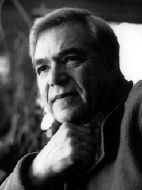Begin by cutting
all branches away
that are now dead.
It is March. One surely feels
in the air a softness
that has not yet arrived.
The cut must be made close
to the parent limb
following the angle
of its growth.
Used snow inches deep shows
yesterday’s boot-prints,
my son’s and mine, circling
each other, circling each tree.
Where two equal branches
now divide, choose one and cut—
it is not good that they contend
for vital sap.
The cut must be made close
to the parent limb,
soon it will smoothly heal.
The chickadees scold us;
by their feeder, they have their rights.
Don't be afraid to cut—that's it,
cut more, it's good for the tree,
lengthening life,
making its fruit full.
A farmer told me to talk
to the trees. Tell them
"this is good for you."
Speak softly. Thank them.
It is June. Our footprints faintly
circle the trees in the moist grass.
Like little berries, the fruit is hard.
They will make it, they will hold on.
See, they will hold on, they will ripen,
they will do well.
It is June. I have learned
to ask for nothing more.
I have never
been happier than this.
Tell them they will do well.
As wind flutters their leaves,
praise them.
It is March. The cut
must be made close
to the parent limb.
Pruning Fruit Trees
Pruning Fruit Trees
By Robert Pack
Prairie Schooner, Vol. 47, No. 3 (Fall 1973), pp. 210-211
Biography
Robert Pack is the author of many books of poetry, most recently Laughter Before Sleep (U of Chicago P). After retiring from Middlebury College, he moved to Montana with his wife. He currently teaches at the University of Montana, where in 2006 he was awarded the university’s presidential medal for outstanding teaching.
